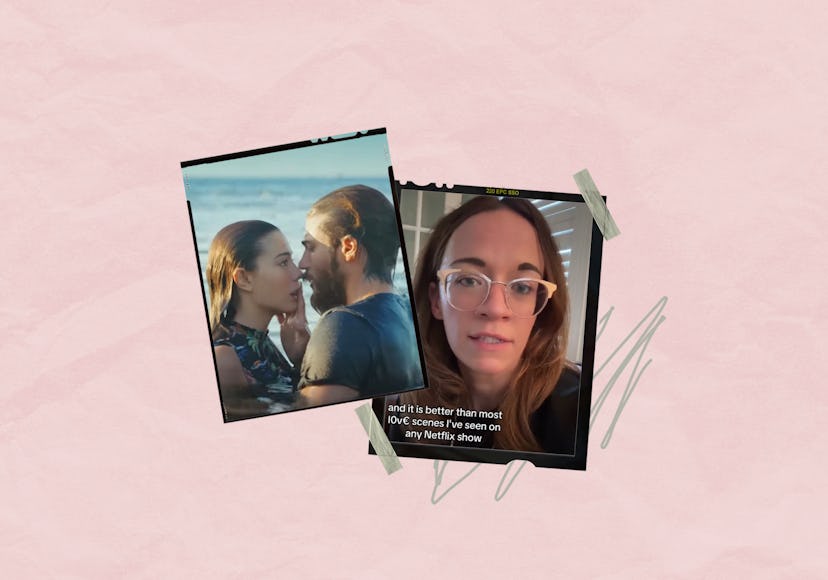TV & Movies
BookTok Is Obsessed With Turkish TV Shows. Romance Authors Know Why.
“I haven’t discovered anything outside of romance novels that hits like this.”

If your corner of BookTok has been buzzing about Turkish TV shows, you’re not alone. Soapy, slow-burn romances, like Erkenci Kuş (Early Bird) and Sen Çal Kapımı (You Knock on My Door), have gradually attracted international fans since their respective releases in 2018 and 2020 — but they recently received a viral boost thanks to a few of the platform’s biggest authors.
Abby Jimenez is one of them. She marathoned Sen Çal Kapımı following a diagnosis of kidney disease in 2020, she tells Bustle, and the series about an enemies-to-lovers fake engagement helped Jimenez through her “worst year.” Its star also inspired the romantic male lead in her 2023 New York Times bestseller, Yours Truly, she shared in a recent TikTok.
“Watching Kerem [Bürsin]’s body language in the show really helped me form Jacob’s body language,” Jimenez says today. “He’s so good at these soft, vulnerable moments. He’s communicating with his eyes and his facial expressions, and he’s not saying a word, and you can just see the wheel is turning in his head.” (Naturally, Jimenez is manifesting casting the Turkish actor to play Jacob, should Yours Truly get the movie treatment.)
For her part, Secretly Yours author Tessa Bailey got into the genre after stumbling on a chemistry-filled clip from Erkenci Kus — a show about a woman who starts a new job at an advertising agency to avoid an arranged marriage, only to fall in love with her boss. In June, Bailey began recapping the series for her 200,000-some TikTok followers, some of whom have since become fans themselves. In the comments for her videos, users thank Bailey for the recommendation — or jokingly blame her for getting them hooked. As newcomers to Turkish dramas quickly learn, these shows are a serious commitment: Erkenci Kuş episodes run for more than two hours apiece, and there are 51 of them in the show’s sole season. That’s pretty standard for these series, which are somewhat akin to soap operas but with a weekly (instead of daily) release schedule.
The long runtime helps viewers build strong connections with characters, Bailey tells Bustle. “It’s because it feels like you’re there for every moment of their lives as opposed to just seeing snippets of it,” she says, adding that the trope-filled nature of shows like Erkenci Kuş (which employs both workplace romance and mistaken identity) could explain why they’ve caught on with romance readers. “Somebody who works in Turkish television understands how appealing those tropes are to our brains.”
Bailey’s readers tend to love the spice — i.e., explicit sexual content — in her books, and it’s often a selling point for BookTok users, in general. You won’t find anything quite so detailed in a typical Turkish drama, but Bailey finds the slow-burn pining in Erkenci Kuş “incredibly sexy” in its own right. “I haven’t discovered anything outside of romance novels that hits like this,” she says. The simmering tension is also a draw for Kristin Curran, co-host of Turkish drama recap podcast Dizzy for Dizi (a play on the Turkish term for “series”). Curran likens the appeal to that of the “Darcy hand flex,” so named after Matthew Macfadyen’s iconic longing gesture in the 2005 adaptation of Pride & Prejudice. The effect is so erotic, she says, “You’re almost not even missing the other stuff.”
Curran also understands the reason for the slow burn: Turkish dramas have to comply with the strict morality standards of Turkey’s Radio and Television Supreme Council (abbreviated as RTÜK). According to one 2018 report from the Hürriyet Daily News, the RTÜK fined one show, Çukur, 260,000 Turkish lira (then about $70,000) after a kiss scene. And in 2021, a jacuzzi scene from Sen Çal Kapımı earned the show a violation for its “erotic connotations,” which were ruled “incompatible with the understanding of public responsibility.” (Everything in that sultry scene is obscured by steam and bath bubbles — it’s comparable to what you might see on, say, Grey’s Anatomy — but the RTÜK still deemed it a violation.) As one screenwriter told The New York Times, the council’s rules are “vague,” and it’s hard to know what will fly — so while kisses of varying intensity are shown, there’s a very real financial incentive to limiting their frequency. Each one has to be “really intentional,” Curran says.
If you want to get immersed in a Turkish series, you have options. Erkenci Kuş is the buzziest dizi on BookTok right now, and is available to watch on YouTube with English subtitles. Others can be found on Netflix, which Curran recommends for beginners — as it’s a format people are familiar with. There’s Netflix original Love 101, for example, which Curran describes as The Breakfast Club meets 90210.
Curran hopes that as the genre gains momentum, it’ll become easier to find your next favorite dizi. “Maybe this will catch the attention of more than just Netflix to realize, ‘Hey, there is a market here,’” Curran says. “Especially for readers, I feel like us watching a subtitled show isn’t that much different from reading a book.”
This article was originally published on